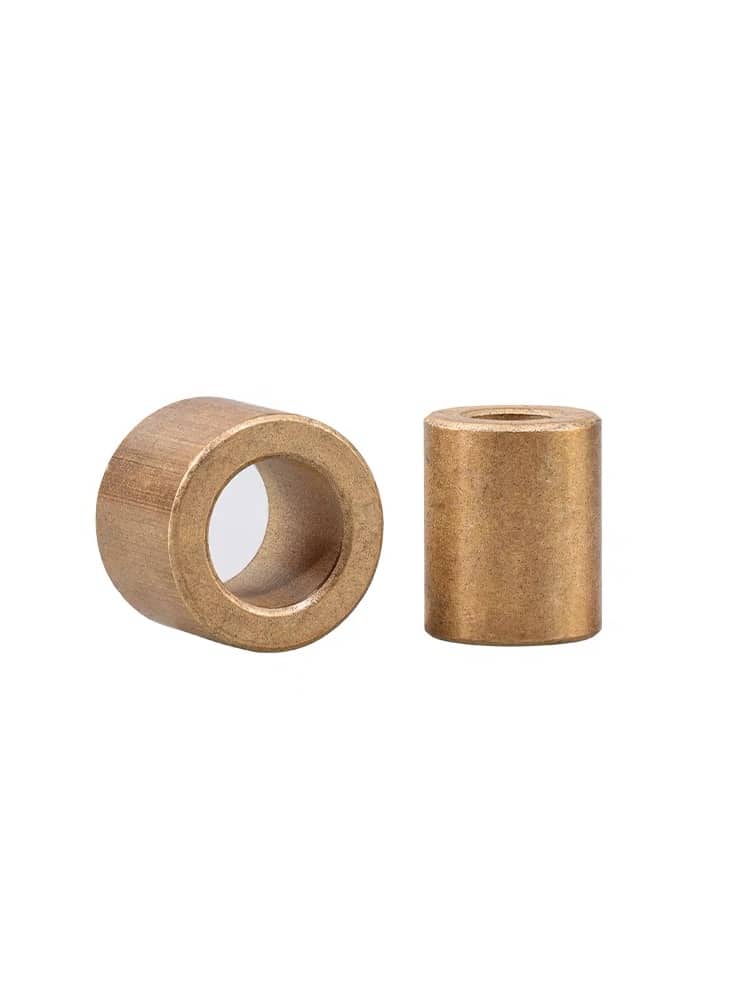Oil Impregnated Copper Bush
Oil Impregnated Copper Bush
Say goodbye to the hassle of frequent lubrication maintenance. Our self-lubricating technology ensures smooth operation and reduces wear and tear, extending the lifespan of your equipment. Experience uninterrupted productivity and cost savings as you bid farewell to the need for messy lubricants and time-consuming upkeep.
Manufacturing on Demand
Oil Impregnated Copper Bush
Powdered Metallurgy Bronze Bushing, Oil Impregnated Copper Bush
Oil-impregnated copper bushings, specifically those made from 663 bronze, are a type of self-lubricating bearing material designed for applications requiring good corrosion resistance and lubrication. The 663 bronze alloy, suitable for hydraulic cylinder bushings, contains not only tin but also zinc, lead, and other reinforcing elements, enhancing its mechanical properties, anti-wear performance, and corrosion resistance. This makes it an excellent choice for hydraulic cylinders and other applications where durability and reliability are critical.
The method of saturating bronze with oil includes a sintering process, where bronze powder is compressed and heated, transforming it into a solid entity. The porosity formed during this sintering process is subsequently infused with lubricating oil, creating a lubricant reservoir that releases under operational conditions to minimize friction and wear. This self-lubricating characteristic is especially advantageous in scenarios where continuous lubrication is challenging, thereby prolonging the lifespan of the bushing and its corresponding machinery.
The composition of 663 bronze alloy, consisting of elements like tin, zinc, and lead, makes it ideal for bearing applications due to its excellent balance of strength and ductility, wear and corrosion resistance, and the capacity to generate a lubricating film on the bearing surface. These attributes are essential for hydraulic cylinder bushings, which face high loads and are required to maintain their integrity and functionality over time in demanding conditions.
In conclusion, oil-impregnated copper bushings crafted from 663 bronze alloy provide a dependable and effective solution for situations that demand self-lubrication, excellent resistance to corrosion, and robustness. Their application in hydraulic cylinders and other rigorous environments highlights the alloy’s capability to fulfill the requirements of sectors where superior performance and dependability are critical.
Oil Impregnated Copper Bush
Oil Impregnated Copper Bush and iron-based powder metallurgy (P/M) components are extensively utilized across various sectors due to their distinct production technique and inherent benefits. The powder metallurgy process entails compressing metal powder into a desired form and subsequently heating (sintering) it below its melting point to unify the particles. This approach provides multiple advantages for fabricating parts in industries like aerospace, automotive, agriculture machinery, engineering machinery, machine tools, commercial machines, household appliances, everyday-use machines, textile machinery, food machinery, power tools, hydraulic parts, and military applications.
Advantages of Powder Metallurgy Parts,Oil Impregnated Copper Bush
- Self-Lubrication: Sintered bearings and bushings, such as Oil Impregnated Copper Bush and iron bushings, boast a self-lubricating feature. This trait stems from the controlled porosity of powder metallurgy components, which can be saturated with oil to ensure ongoing lubrication during use.
- Cost-Effectiveness: The P/M method is an affordable, high-volume technique for manufacturing parts to precise or nearly exact dimensions with minimal to no machining needed. This leads to reduced waste and more efficient production at large scales.
- Maintenance-Free: The oil impregnation of these bronze bushings renders them self-lubricating, hence maintenance-free, negating the need for extra lubrication.
- Versatility and Customization: Powder metallurgy facilitates the creation of parts in various shapes and sizes, allowing precise control over material porosity. This adaptability enables the production of components tailored to specific applications and performance demands.
- Material Efficiency: The P/M process is highly material-efficient, with about 97% of the materials used in press-and-sinter processing becoming part of the final product.
Disadvantages and Considerations
- Mechanical Strength Limitations: The mechanical strength of P/M components may be inferior compared to those produced by other manufacturing methods, a drawback linked to the sintering process and the material’s porosity.
- Application Restrictions: Although oil-infused bushings are suitable for moderate to low load applications, they may not be ideal where the impregnated oil could contaminate other elements or substances.
- Lubrication Dependency: Despite their self-lubricating nature, the effectiveness of these bushings’ lubrication can vary based on operational conditions, like temperature and speed. In certain scenarios, additional lubrication or seals might be necessary.
In summary, Oil Impregnated Copper Bush and iron base P/M parts present considerable advantages for numerous industrial uses, such as self-lubrication, cost-efficiency, and maintenance-free operation. Nevertheless, it’s crucial to acknowledge their mechanical strength limitations and application constraints when choosing these components for specific purposes.
Your expert in self-lubricating Bearing
and Bronze alloys – serving globally


